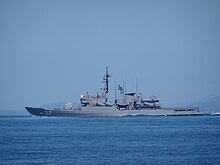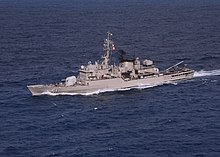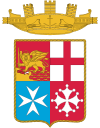Lupo-class frigate
 Peruvian Navy frigate BAP Carvajal participating in Southern Seas 2010 | |
| Class overview | |
|---|---|
| Name | Lupo class |
| Builders |
|
| Operators | |
| Preceded by | Alpino class |
| Succeeded by | Maestrale class |
| Subclasses |
|
| In commission | 1977 |
| Planned | 18 |
| Completed | 18 |
| Active | 10 |
| Laid up | 5 |
| Retired | 8 |
| Scrapped | 3 |
| General characteristics | |
| Type | Guided-missile frigate |
| Displacement | 2.506 t (2.466 long tons) full load |
| Length | 113.2 m (371 ft) LOA |
| Beam | 11.3 m (37 ft) |
| Draft | 3.7 m (12 ft) |
| Propulsion |
|
| Speed |
|
| Range | 4,300 nmi (8,000 km) at 16 kn (30 km/h) |
| Complement | 185 (20 officers) |
| Sensors and processing systems |
|
| Electronic warfare & decoys |
|
| Armament |
|
| Aircraft carried | 1 AB-212ASW helicopter |
| Aviation facilities |
|
The Lupo class is a class of frigates built by Cantieri Navali Riuniti (CNR) for the Italian Navy. Designed as multipurpose warships with an emphasis on anti-surface warfare (ASuW), they have enjoyed some success in the export market, being acquired by the navies of Peru and Venezuela. A small run of a slightly updated version is known as the Soldati class.
Design
In the early 1970s, the Italian Navy faced an increased Soviet naval presence in the Mediterranean Sea which constituted a threat to its sea lines of communication as well as to its extensive coastline. To parry this menace, Italy started a naval expansion program which included frigates focused on ASuW (Lupo class) and on ASW (Maestrale class).
For the first part of the requirement, CNR presented a design for a 2,500-ton frigate with a high speed and a heavy weapons load. The ship employed a CODOG propulsion plant to achieve 35 knots, making it one of the fastest warships at the time. Armament included 8 SSMs, 8 SAMs, several gun systems, 2 triple torpedo tubes and an ASW helicopter, which was equivalent to that carried by larger warships. Lupo-class frigates have a crew of around 200.
Italian Navy
The Italian Navy commissioned four Lupo-class frigates between 1977 and 1980. These ships were deployed to the Persian Gulf first as escorts for tankers during the last stages of the Iran–Iraq War (1987–1988) and then as part of the Coalition forces during the 1990–1991 Gulf War. After these operations, the whole class underwent modernization which included fitting an SPS-702 CORA surface search radar and SATCOM equipment. After two decades in service, the four Italian Lupo-class frigates were decommissioned and sold to Peru in the early 2000s.
In 1996 four new Lupo-class frigates which had been built for Iraq in 1985–87, were incorporated into the Italian Navy as the Artigliere class. These ships feature a telescopic hangar; they were refitted as patrol ships and changes made for Italian service included the removal of all ASW equipment. The four ships are Artigliere ("artilleryman" - pennant F 582), Aviere ("airman" - F 583), Bersagliere ("sharpshooter" - F 584) and Granatiere ("grenadier" - F 585), and are used in fleet escort or long-range patrolling duties.
Ships
| Pennant number |
Ship | Builder | Hull number |
Laid down | Launched | Commissioned | Motto | Fate | ||
|---|---|---|---|---|---|---|---|---|---|---|
| F 564 | Lupo | Cantieri Navali Riuniti, Riva Trigoso | 300 | 11 October 1974 | 29 July 1976 | 12 September 1977 | Fulmineo sulla preda | Transferred to Peru, renamed Palacios | ||
| F 565 | Sagittario | 301 | 4 February 1976 | 22 June 1977 | 18 November 1978 | Non cohibetur sagitta | Transferred to Peru, renamed Quiñones | |||
| F 566 | Perseo | 302 | 28 February 1977 | 12 July 1978 | 1 March 1980 | Vincerà chi vorrà vincere | Transferred to Peru, renamed Coronel Bolognesi | |||
| F 567 | Orsa | Cantieri Navali Riuniti, Muggiano | 303 | 1 August 1977 | 1 March 1979 | 1 March 1980 | Fortitude Fortior | Transferred to Peru, renamed Aguirre | ||


Soldati-class patrol frigate
Iraq ordered four Lupo-class frigates from CNR in 1980 as part of a naval expansion program just before the Iran–Iraq War.[1] These ships, which feature a telescopic hangar were completed between 1985 and 1987. Due to restrictions on arm sales to Iraq because of the Iran-Iraq War placed by the Italian prime minister Bettino Craxi, the ships remained interned in Italy until the end of that war in 1988. Iraqi President Saddam Hussein then tried to renegotiate the price of these ships (and the other ships purchased from Italy), claiming he should receive a discount due to the delay in delivery of the ships.[1] Negotiations and court proceedings were still ongoing when Iraq invaded Kuwait in 1990 and a new arms embargo against Iraq was placed by the United Nations, again blocking the sale.[1] In 1993 all of them were seized and, after being refitted as patrol ships, incorporated to the Italian Navy as the Soldati class in 1996. Changes made for Italian service included the removal of all ASW equipment. The four ships are Artigliere (pennant F 582), Aviere (F 583), Bersagliere (F 584) and Granatiere (F 585), and are used in fleet escort or long range patrolling duties. The Philippines considered acquiring the Soldati class in 2012.[2]
F582 and F584 wete scrapped in Aliaga in 2024.[3]
| Pennant number |
Ship | Builder | Hull number |
Laid down | Launched | Commissioned | Decommissioned | Motto | ||
|---|---|---|---|---|---|---|---|---|---|---|
| F 582 | Artigliere (ex-Hittin) | Fincantieri, Ancona | 903 | 31 March 1982 | 27 July 1983 | 28 October 1994 | 13 December 2013 | Primi Velitum | ||
| F 583 | Aviere (ex-Thi Qar) | 904 | 3 September 1982 | 19 December 1984 | 4 January 1995 | 2 October 2019 | Virtute Siderum Tenus | |||
| F 584 | Bersagliere (ex-Al Yarmouk) | Fincantieri, Riva Trigoso | 905 | 12 March 1984 | 18 April 1985 | 8 November 1995 | 17 April 2018[4] | Pro Patria | ||
| F 585 | Granatiere (ex-Al Qadisiya) | Fincantieri, Ancona | 906 | 1 December 1983 | 1 June 1985 | 20 March 1996 | 30 September 2015 | A me le guardie | ||
Peruvian Navy

Peru became involved early in the Lupo-class frigate program, ordering four ships in 1973. The Peruvian ships were built to a modified design which included different radars, Aspide instead of Sea Sparrow SAMs, and a fixed instead of a telescopic hangar. The first two were built by CNR at its shipyard in Riva Trigoso, Genoa, and commissioned in 1979.
Construction work for the second pair was carried out under license by SIMA (Servicio Industrial de la Marina, Navy Industrial Service) at Callao, with the ships commissioning in 1984 and 1987. Of the Peruvian Lupos, BAP Carvajal (FM-51), BAP Mariátegui (FM-54), BAP Villavicencio (FM-52) and BAP Montero (now BAP Almirante Grau) (FM-53) had their flight decks extended to allow ASH-3D Sea King helicopters to land and refuel, even though they cannot be housed in the ship's hangar.
In November 2004 other ex-Italian Lupo-class vessels were incorporated into the Peruvian Navy: BAP Aguirre (FM-55) (ex-Orsa) and BAP Palacios (FM-56) (ex-Lupo). Finally in August 2006 the last Italian Lupo ships arrived in Callao: BAP Quiñones (FM-58) and BAP Bolognesi (FM-57). In 2013, Carvajal was transferred to the Peruvian Coast Guard and renamed Guardiamarina San Martin.[5]
Ships

| Carvajal class | |||||||
| Pennant number | Ship | Builder | Hull number |
Laid down | Launched | Commissioned | Fate |
|---|---|---|---|---|---|---|---|
| FM-51 | Carvajal | Cantieri Navali Riuniti, Riva Trigoso | 304 | 8 August 1974 | 17 November 1976 | 5 February 1979 | Transferred to Peruvian Coast Guard in 2013, renamed Guardiamarina San Martin |
| FM-52 | Villavicencio | 305 | 6 October 1976 | 7 February 1978 | 25 June 1979 | Active in service | |
| FM-53 | Montero (later Almirante Grau) | SIMA, Callao | October 1978 | 8 October 1982 | 25 July 1984 | Active in service. Renamed 2017 | |
| FM-54 | Mariátegui | 1979 | 8 October 1984 | 10 October 1987 | Active in service | ||
| ex-Italian Lupo class | |||||||
| FM-55 | Aguirre | Cantieri Navali Riuniti, Muggiano | 303 | 1 August 1977 | 1 March 1979 | ex-Orsa | |
| FM-56 | Palacios | Cantieri Navali Riuniti, Riva Trigoso | 300 | 11 October 1974 | 29 July 1976 | ex-Lupo | |
| FM-57 | Coronel Bolognesi | 302 | 28 February 1977 | 12 July 1978 | ex-Perseo | ||
| FM-58 | Quiñones | 301 | 4 February 1976 | 22 June 1977 | ex-Sagittario | ||
Venezuelan Navy


Venezuela ordered six Lupo-class frigates from CNR in 1975 as a replacement for older warships. These units were commissioned between 1980 and 1982. In general terms, their appearance and equipment is similar to those built for Peru, except for some differences in electronics and missiles. The first two ships, ARV Mariscal Sucre (F-21) and ARV Almirante Brión (F-22) were upgraded by Ingalls Shipbuilding over a four years period (1998–2002). Modifications of these two ships included:
- Fitting of Elbit NTCS 2000 combat management system
- Fitting of Elta EL/M-2238 Single Face STAR 3D air/surface radar
- Fitting of Northrop Grumman 21 HS-7 hull sonar
- Fitting of Elisra NS-9003 ESM system
- Fitting of Elisra NS-9005 ECM system
- Replacement of 2 GMT A230-20M diesel engines with 2 MTU 20V 1163.
The other ships in Venezuelan service were expected to undergo an austere version of this upgrade, but three ships were eventually taken out of service. As of December 2022, however, the Mariscal Sucre has been observed to be partially sunk alongside the partially scrapped General Soublette.[6]
Ships
| Mariscal Sucre class | |||||||
| Pennant number |
Ship | Builder | Hull number |
Laid down | Launched | Commissioned | Fate |
|---|---|---|---|---|---|---|---|
| F-21 | Mariscal Sucre | Cantieri Navali Riuniti, Riva Trigoso | 851 | 19 November 1976 | 28 September 1978 | 10 May 1980 | Out of service; partially sunk |
| F-22 | Almirante Brión | 853 | June 1977 | 22 February 1979 | 7 March 1981 | In service | |
| F-23 | General Urdaneta | 852 | 23 January 1978 | 23 March 1979 | 8 August 1981 | Out of service | |
| F-24 | General Soublette | 855 | 26 August 1978 | 4 January 1980 | 5 December 1981 | Out of service; partially scrapped | |
| F-25 | General Salom | 854 | 7 November 1978 | 13 January 1980 | 3 April 1982 | Out of service; reportedly sold for scrap[7] | |
| F-26 | Almirante Garcia (ex-José Felix Ribas) | 856 | 21 August 1979 | 4 October 1980 | 30 July 1982 | Out of service | |
See also
References
- ^ a b c Duval Smith, Alex (4 January 2003). "This Europe: Lying idle off Italy's coast, the pride and joy of the Iraqi navy". The Independent. London.
- ^ Romero, Alexis (8 February 2012). "DND signs 5-year agreement with Italy". Philippine Star. Archived from the original on 6 September 2012. Retrieved 5 April 2012.
- ^ "Wikipedia:Spielwiese – Wikipedia". Archived from the original on 2024-05-21.
- ^ Italian Navy retires Bersagliere frigate, Jane's 360, 17 April 2018, retrieved 17 April 2018
- ^ "Marina de Guerra del Perú realizará ceremonia de Zarpe de Expedición Científica a la Antártida – ANTAR XXII, Colocación de la Quilla del Remolcador Auxiliar de Salvamento y Patrullera Marítima, Transferencia del BAP Carvajal a DICAPI" (in Spanish). Peruvian Navy. 23 December 2013. Archived from the original on 27 December 2013. Retrieved 17 February 2015.
- ^ "Frigate Soublette (F-24) (left), dismantled and scrapped, and Mariscal Sucre (F-21) (right) partially sunk at the Puerto Cabello naval base of the Venezuelan Navy". Facebook. 2022-12-09. Retrieved 2023-11-14.
- ^ Seawaves Magazine [@seawaves_mag] (11 January 2023). "Retired Venezuelan Lupo Class frigate General Salom reported to have been sold for scrap" (Tweet). Retrieved 12 February 2024 – via Twitter.
Sources
- Faulkner, Keith, Jane's Warship Recognition Guide. 2nd edition. Jane's Information Group, 1999.
- (in Spanish) Rodríguez, John, "Las fragatas Lupo: una breve mirada retrospectiva y perspectivas". Revista de Marina, Year 95, No. 3: 8–32 (July / December 2002).


